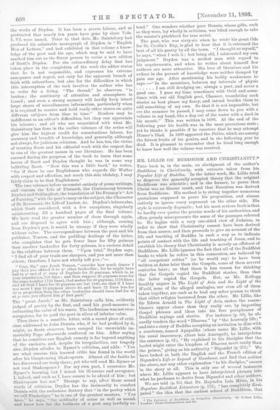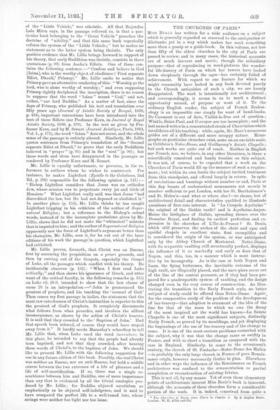MR. LILLIE ON BUDDHISM AND CHRISTIANITY.* THIS book is, in
the main, an abridgment of the author's Buddhism in Christianity, with extracts taken from his Popular Life of Buddha. In the latter work, Mr. Lillie tried to disprove the generally accepted theory that the original Buddhism was atheistic ; and in the former, to prove that Christ was an Essene monk, and that Essenism was derived from Buddhism. His method is to string together numerous quotations supposed to prove his proposition, and almost entirely to ignore every argument on the other side. His style is extremely dogmatic ; but his most serious fault is that he hardly ever quotes the precise words of his authorities, and often grossly misrepresents the sense of the passages referred to. He begins with a very one-sided view of Judaism, in order to show that Christianity cannot have been derived from that source, and then proceeds to give an account of the life and teaching of Buddha in such a way as to indicate points of contact with the life and teaching of Jesus, and to establish his theory that Christianity is merely an offshoot of Buddhism. Mr. Lillie ignores the fact that all of the Buddhist books to which he refers in this connection, are believed by "all competent critics" (as he would say) to have been written at dates later than the Gospels, some of them several centuries later ; so that there is less reason for thinking that the Gospels copied the Buddhist stories, than that the latter copied the Gospels. But, as Mr. Kellogg forcibly argues in The Light of Asia and the Light of the World, none of the alleged analogies, nor even all of them taken together, are such as to lead any sober person to think that either religion borrowed from the other. Mr. Lillie, like Sir Edwin Arnold in The Light of Asia, makes the resem- blances appear closer than they really are, by importing Gospel phrases and ideas into his free paraphrases of Buddhist sayings and stories. For instance (p. 50), he ab- surdly renders the word "Dharma " by "the heavenly life ; " and into a story of Buddha accepting an invitation to dine with a courtesan, named Apapalika (whose name Mr. Lillie, with his usual inaccuracy, alters into Amrapali), he interpolates the sentence (p. 61), "He explained to his disciples that the harlot might enter the kingdom of Dharma. more easily than the prince," giving as his authority " Bigandet (p. 251)." We have looked at both the English and the French edition of Bigandet's Life or Legend of Gaudama, and find that neither the above, nor any other explanation "to his disciples," occurs in the story at all. This is only one of several instances where Mr. Lillie appears to have interpolated phrases into what he professes to derive from Bigandet and other authors. We are told (p. 85) that Dr. Rajendra Lela Mitre, in his Nepalese Buddhist Literature (p. 178), "has completely dissi. paled" the idea that the earliest school of Buddhism, that * The Influence of Buddhism on Primitive Christianity. By Arthur Lillie. London: Swan Sonnonsolleiu and Co. of the "Little Vehicle," was atheistic. All that Rajendra Lala, Mitra says, in the passage referred to, is that a par- ticular book belonging to the "Great Vehicle" preaches the doctrine of "nihility," and that this same book repeatedly refutes the system of the "Little Vehicle ; " but he makes no statement as to the latter system being theistic. The only positive evidence that Mr. Lillie brings forward in support of his theory, that early Buddhism was theistic, consists in three quotations (p. 93) from Asoka's Edicts. One of these con- tains the following sentence :—" Confess and believe in God [Isilna], who is the worthy object of obedience (‘ First separate Edict, Dhauli,' Prinsep)." Mr. Lillie omits to notice that Prinsep gave an alternative rendering of this : "Worship ye the lord, who is alone worthy of worship ; " and even supposing Prinsep rightly deciphered the inscription, there is no reason to suppose that the word " Isitna " meant "God," and not, rather, "our lord Buddha." As a matter of fact, since the days of Prinsep, who published his text and translation over fifty years ago (Journal of Asiatic Society of Bengal, 1838, p. 434), important corrections have been introduced into the text of these Edicts (see Professor Kern, in Journal of Royal Asiatic Society, 1880, p. 379). In the text as given by Pro- fessor Kern, and by M. Senart ;Journal Asiatique, Paris, 1883, Vol. I., p. 171), the word " 'Ana " does not occur, and the whole sense of the passage is entirely altered. Similarly, Mr. Lillie quotes sentences from Prinsep's translation of the "Second separate Edict at Dhauli," to prove that the early Buddhists believed in " prayer " (p. 95) and in the " soul " (p. 96); but these words and ideas have disappeared in the passages as rendered by Professor Kern and M. Senart.
Mr. Lillie is equally unfortunate, or perverse, in his re- ferences to authors whom he wishes to controvert. For instance, he makes Lightfoot (Epistle to the Galatians, 2nd Ed., p. 286) responsible for the following opinion (p. 141) :— "Bishop Lightfoot considers that Jesus was an orthodox Jew, whose mission was to perpetuate every jot and tittle of Mosaism." What Lightfoot really said was that Jesus "had discredited the law, but He had not deposed or abolished it." In another place (p. 153), Mr. Lillie thinks he has caught Lightfoot tripping in his criticism of the author of Super- natural Religion; but a reference to the Bishop's actual words, instead of to the incomplete quotations given by Mr. Lillie, shows that be did not make the " whimsical " mistake that is impnted to him ; and the author of Supernatural Religion apparently saw the force of Lightfoot's argument better than his champion, Mr. Lillie, sees it, for he cut out of the later editions of his work the passage:in question, which Lightfoot had criticised.
Mr. Lillie proves, forsooth, that Christ was an Essene, first by assuming the proposition on a priori grounds, and then by cutting out of the Gospels, especially the Gospel of Luke, all the passages which conflict with his theory. He incidentally observes (p. 152) : "When I first read Luke critically;" and then shows his ignorance of Greek, and utter want of the critical faculty, in the following remarks (p. 155) on Luke vii. 28-9, intended to show that the last clause of verse 28 is an interpolation :—" John is pronounced the greatest of prophets, and his teaching the 'counsel of God.' Then comes ray first passage in italics, the statement that the most raw catechumen of Christ's instruction is superior to this the greatest of God's prophets. It completely disconnects what follows from what precedes, and involves the silliest inconsequence, as shown by the action of Christ's hearers. It is said that they crowded to the Baptism of John.' Had that speech been uttered, of course they would have stayed away from it." It hardly needs Macaulay's schoolboy to tell Mr. Lillie that, when Luke used the word Par TlaBines in this place, he intended to say that the people had already been baptised, and not that they crowded, after hearing these words of Christ's. to the baptism of John. We should like to present Mr. Lillie with the following suggestion for use in any future edition of this book. Possibly, the real Christ was neither an Essene, nor an anti-Essene, but held a middle course between the two extremes of a life of pleasure and a life of self-mortification. If so, there was a single re. semblance between him and Buddha, one of more importance than any that is evidenced by all the trivial analogies pro- duced by Mr. Lillie ; for Buddha abjured asceticism as emphatically as he abjured self-indulgence, and is said to have compared the perfect life to a well-tuned lute, whose strings were neither too tight nor too loose.







































 Previous page
Previous page